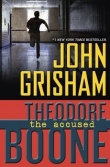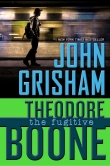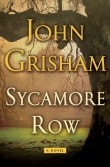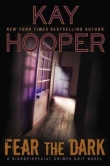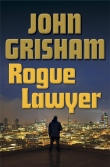
Текст книги "Gray Mountain"
Автор книги: John Grisham
Соавторы: John Grisham
Жанры:
Политические детективы
,сообщить о нарушении
Текущая страница: 15 (всего у книги 27 страниц)
Samantha was in the conference room with Mattie and Annette, and all three reveled in the verdict. They high-fived, fist-pumped, and chatted excitedly as if their own little firm had done something great. It wasn’t Donovan’s first million-dollar verdict—he’d had one in West Virginia and one in Kentucky, both coal truck collisions—but it was his largest. They were happy, even giddy, and no one was really sure if they were more excited over winning or relieved at not losing. It didn’t matter.
So this is what litigation is all about, Samantha thought. Maybe she was beginning to understand. This was the rush, the high, the narcotic that pushed trial lawyers to the brink. This was the thrill that Donovan sought when he refused to settle for cash on the table. This was the overdose of testosterone that inspired men like her father to dash around the world chasing cases.
Mattie declared that they would throw a party. She called Chester and snapped him into high gear. Burgers on the grill in their backyard, with champagne to start and beer to finish. Two hours later, the party materialized perfectly in the cool evening. Donovan proved to be a graceful winner, deflecting congratulations and giving his client all the credit. Lisa was there, alone. In addition to the hosts and Samantha, the crowd included Annette with Kim and Adam; Barb and her husband, Wilt; Claudelle and her husband; Vic Canzarro and his girlfriend; and Jeff.
In a toast, Mattie said, “Victories are rare in our business, so let’s savor this moment of triumph, good over evil and all that jazz, and wipe out these three bottles of champagne. Cheers!”
Samantha was sitting in a wicker patio swing chatting with Kim when Jeff asked if she needed a top-off. She did, and he took her empty glass. When he returned, he looked at the narrow empty spot beside her, and she invited him to have a seat. It was very cozy. Kim got bored and left them. The air was cool, but the champagne kept them warm.
21
Her second adventure in the Cessna Skyhawk was not quite as thrilling as the first. They waited at the Noland County Airfield an hour for some weather to move on. Perhaps they should have waited longer. Donovan at one point mumbled something about postponing the trip. Jeff, also a pilot, seemed to agree, but then saw a break in the front and thought they could make it. After watching them study a weather screen at the terminal and fret over “turbulence,” Samantha was secretly hoping they would cancel. But they did not. They took off into the clouds, and for the first ten minutes she thought she might be sick. From the front, Donovan said, “Hang on,” as the small plane was tossed about. Hang on to what, exactly? She was in the rear seat, which was cramped even for her. She had been relegated to second class and was already promising herself she would never do this again. Bullets of rain pecked vigorously at the windshield.
At six thousand feet the clouds thinned considerably and the ride became smooth. Up front both pilots seemed to relax. All three on board had headsets, and Samantha, breathing normally, was fascinated by the radio. The Skyhawk was being handled by Washington air traffic control, and there were at least four other aircraft on the same frequency. Everyone was terribly excited about the weather, with pilots calling in the latest updates based on what they had encountered. Her fascination, though, soon led to boredom as they hummed along, bouncing slightly on top of the clouds. She could see nothing below, and nothing on either side. An hour in and she almost nodded off.
Two hours and fifteen minutes after they left Brady, they landed at a small airport in Manassas, Virginia. They rented a car, found a drive-thru for carryout lunch tacos, and arrived at the Kofer Group’s new digs in Alexandria at 1:00 p.m. Marshall greeted them warmly and apologized for the emptiness of the place. It was, after all, Saturday.
Marshall was delighted to see his daughter, especially under the circumstances. She was hanging around with a real trial lawyer and seemed keenly interested in pursuing a promising lawsuit against corporate bad guys. After just two weeks in the coalfields she was well on her way to a real conversion. He had been trying in vain for years to show her the light.
After some small talk, Marshall said to Donovan, “Congrats on the verdict down there. Tough place to get one.”
Samantha had not mentioned the Tate verdict to her father. She had e-mailed him twice with details about the meeting, but nothing about the trial. Donovan said, “Thanks. There was a line or two in the Roanoke paper. I guess you saw it.”
“Missed that,” he said. “We monitor a lot of trials through a national network. Your story popped up late last night and I read the summary. A great set of facts.”
They were seated around a square table with real flowers in the center, next to coffee in a silver pot. Marshall had dressed down and was slumming in a cashmere sweater and slacks. The Gray boys were in jeans and old sports coats. Samantha wore jeans and a sweater.
Donovan said thanks again and answered Marshall’s questions about the trial. Jeff said nothing and missed nothing. He and Samantha exchanged looks occasionally. She poured more coffee and finally said, “Perhaps we should move along.”
“Right,” Marshall said as he took a sip. “How much do I know?”
“There’s nothing new,” Samantha said. “I’ve just started digging and I’m sure we’ll learn a lot more after I file the claim for black lung benefits.”
“Casper Slate has a nasty reputation,” Marshall said.
“They’ve earned it,” Donovan replied. “I’ve fought them for a long time.”
“Give me your lawsuit. Give me your theory.”
Donovan took a deep breath and glanced at Samantha. He said, “Federal court, probably in Kentucky. Maybe West Virginia. Certainly not Virginia because of the caps on damages. We file the lawsuit with one plaintiff, Buddy Ryzer, and we sue Casper Slate and Lonerock Coal. We allege fraud and conspiracy, perhaps racketeering, and we ask for the moon in punitive damages. It’s a punitive case, plain and simple. Lonerock Coal is currently capitalized at six billion and insured to the hilt. Casper Slate is private and we don’t know what it’s worth, but we’ll find out. As we dig, we hope we find other fraud cases. The more the better. But if we don’t, we’ll always be ready to take the Ryzer case to the jury and ask for a fortune in punitives.”
Marshall nodded as if he agreed, as if he’d done this a hundred times.
Donovan paused and asked, “What’s your take on it?”
“Agreed, so far. It sounds good, especially if the fraud really exists and there’s no way to explain it away. It certainly looks legitimate, and the jury appeal is fantastic. Actually, I think it’s brilliant. A corrupt law firm full of high-priced lawyers hiding medical evidence to beat some poor, sick miner out of his meager benefits. Wow! It’s a trial lawyer’s dream. It’s a clear punitive case with tremendous upside potential.” He paused, took a calculated sip, and continued. “But, first, of course, there is the little matter of the actual lawsuit. You practice alone, Donovan, with almost no staff and, shall we say, limited resources. A lawsuit like this will take five years and cost $2 million, minimum.”
“One million,” Donovan said.
“Split the difference. One and a half. I’m assuming that’s still out of your reach.”
“It is, but I have friends, Mr. Kofer.”
“Let’s go with Marshall, shall we?”
“Sure, Marshall. There are two law firms in West Virginia and two in Kentucky that I conspire with. We often pool our money and resources and divide the work. Still, I’m not sure we can risk that much. I suppose that’s why we’re here.”
Marshall shrugged and laughed and said, “That’s my business. The litigation wars. I consult with lawyers and with litigation funders. I play matchmaker between the guys with the cash and the guys with the cases.”
“So you can arrange one or two million for the litigation expenses?”
“Sure, that’s no problem, not in this line. Most of our work involves between ten and fifty million. Two mill is easy.”
“And how much does it cost us, the lawyers?”
“That depends on the fund. The great thing about this case is that it’ll cost two million, let’s say, and not thirty million. The less you take for expenses, the more you keep in fees. I’m assuming you’ll get 50 percent of the recovery.”
“I’ve never asked for 50 percent.”
“Well, welcome to the big leagues, Donovan. In all major cases the trial lawyers get 50 percent these days. And why not? You take all the risks, do all the work, and put up all the money. A big verdict is a windfall for a client like Buddy Ryzer. Poor guy’s trying to get a thousand dollars a month. Get him a few million and he’s a happy dude, right?”
“I’ll think about it. I’ve never taken more than 40.”
“Well, it may be difficult to arrange funding if we’re not at 50. That’s just the way it is. So we line up the money, now what about the manpower? Casper Slate will throw an army of lawyers at you, their best and brightest, meanest and slickest, and if you think they cheat now, just wait until their own necks are on the line and they’re trying to hide their dirty underwear. It’ll be a war, Donovan, one like we seldom see.”
“You ever sue a law firm?”
“No. I was too busy suing airlines. Believe me, they were tough enough.”
“What was your biggest verdict?”
Samantha almost said, “Please, come on.” The last thing they needed was Marshall Kofer onstage telling his war stories. Without the slightest hesitation, he gave that smug smile and said, “I popped Braniff for forty million in San Juan, Puerto Rico, in 1982. Took seven weeks.”
She wanted to ask, Great, Dad, and was that the fee you kept offshore and tried to bury until Mom got wind of it?
Marshall continued, “I was the lead lawyer, but there were four of us, and we worked our tails off. My point, Donovan, is that you will need some high-powered help. The fund will scrutinize you and your team before it commits the money.”
Donovan said, “I’m not worried about the team, or the preparation, or the trial. I’ve spent my career looking for a case like this. The lawyers I bring in are all veteran trial lawyers and they know the terrain. This is our backyard. The jurors will be our people. The judge, we can only hope, will be beyond the reach of the defendants. And on appeal, the verdict will be in the hands of federal judges, not state judges elected by the coal companies.”
“I realize this,” Marshall said.
“You didn’t answer the question,” Jeff said, almost rudely. “How much do we give up in exchange for the funding?”
Marshall shot him a hard look, then instinctively smiled and said, “Depends. It’s negotiable. That’s my job to arrange the deal, but, just guessing, I’d say the fund I have in mind would ask for a fourth of the attorneys’ fees. As you know, it’s impossible to predict what a jury might do; therefore it’s impossible to project what the fees might be. If the jury gives you, say, ten million, and the expenses are two, then the expenses come off the top and you split eight with your client. He gets four million, you get the same. The fund gets a quarter of that. You get the rest. Not a great deal for the fund, but not a loser either. A 50 percent return. Needless to say here, fellas, but the bigger the verdict the better. Personally, I think ten million is low. I can see a jury getting highly agitated with Casper Slate and Lonerock Coal and going for blood.”
He was quite convincing, and Samantha had to remind herself that he once extracted huge sums from juries.
“Who are these guys?” Donovan asked.
“Investors, other funds, hedge funds, private equity guys, you name it. There is a surprising number of Asians who have discovered the game. They’re petrified by our tort system but also captivated by it. They think they’re missing something. I have several retired lawyers who struck gold in their day. They know litigation and are not afraid of the risks. They’ve done quite well in this business.”
Donovan seemed unsure. “I’m sorry,” he said. “This is all new to me. I’ve heard of litigation funds but I’ve never been near one.” Marshall said, “It’s just old-fashioned capitalism, but from our side of the street. Now a plaintiffs’ lawyer with a great case but no money can take on corporate thugs anywhere and level the field.”
“And they review the case and predict the outcome?”
“That’s my job, really. I consult with both sides—the trial lawyer and the fund. Based on what Samantha has told me, and a review of the pertinent documents, and especially because of your growing reputation in the courtroom, I have no hesitation in recommending this case to one of my funds. It will approve one to two million bucks in short order, and you’re in business.”
Donovan looked at Jeff, who looked at Marshall and asked, “Back in your prime, Mr. Kofer, would you take this case?”
“In a heartbeat. Big law firms make lousy defendants, especially when you catch ’em red-handed.”
Donovan asked Samantha, “Do you think Buddy Ryzer is up to the challenge?”
She replied, “I have no idea. All he wants are his benefits, present and past. We haven’t discussed a lawsuit like this. In fact, he doesn’t even know all the stuff I found in his medical records. I was planning on meeting with him next week.”
“What’s your gut feeling?”
“You want my gut feeling about something I know nothing about?”
“Yes or no?”
“Yes. He’s a fighter.”

They walked down the street to a sports bar with five screens all showing college football. Donovan was a Hokie from Virginia Tech, rabid as all of them, and was keen to find scores. They ordered beers and gathered around a table. After the waiter placed four tall mugs in front of them, Marshall said to Donovan, “Your name popped up online last night. I was looking at contamination cases in the coalfields—sorry but that’s how I spend my reading time—and I came across the Peck Mountain sludge pond and the Hammer Valley cancer cluster. According to a story in the Charleston paper, you’ve been investigating the case for some time. Anything in the works?”
Donovan made eye contact with Samantha, who quickly shook her head. No, I haven’t said a word. He said, “We’re still investigating, and signing up clients.”
“Clients mean a lawsuit, right? Not prying here, just a bit curious. It sounds like a massive case, and a very expensive one. Krull Mining is a monster.”
“I know Krull very well,” Donovan said, with caution. Not for a split second would he trust Marshall Kofer with any information he might swap or barter in another deal. When it was obvious he preferred not to talk about the case, Marshall said, “Oh well, I know two funds that specialize in toxic waste cases. It’s an extremely lucrative area, I might add.”
Is everything lucrative, Dad? Samantha wanted to ask. Then she thought, What a perfect match! Donovan Gray and his gang who either have possession of, or access to, a treasure trove of ill-gotten documents once owned by Krull Mining, and the Kofer Group, a gang of disbarred lawyers who no doubt would bend the law again if put in a bind. That was just in one corner. In the other corner was Krull Mining, a company with the worst safety record in the history of U.S. coal production and an owner who was reputed to be one of the deadliest Russian gangsters in Putin’s frat pack. And in the center of the ring, and dodging bullets, were the poor and suffering souls of Hammer Valley who’d been cajoled out of their trailers and sweet-talked into signing up for this thrilling adventure into American tort law. They would be named as plaintiffs and sue for a billion dollars. If they got a thousand they’d spend it on cigarettes and lottery tickets. Wow! Samantha chugged her beer and once again vowed to avoid serious litigation. She watched football on two screens but had no idea who was playing.
Marshall was telling a story about two jets—one from Korea and one from India—that collided over the Hanoi airport in 1992. Everybody was dead and nobody was from America; however, Marshall filed suit in Houston where the juries understand big verdicts. This fascinated Donovan, and Jeff seemed mildly interested. That was enough of an audience for Marshall. Samantha kept watching the game.
After one beer—Donovan was piloting—they walked back to the office and said good-bye. Samantha noticed that the sun was out and the sky was clear. Perhaps the ride home would be nice and smooth, with great visibility.
She pecked her father on the cheek and promised to call later.
22
The Tate verdict brought excitement to the area and was a source of endless gossip and speculation. According to a story in the Roanoke paper, Strayhorn Coal was promising a vigorous appeal. Its lawyers had little to say, but others were not so timid. A vice president of the company called the verdict “shocking.” A mouthpiece for some economic development group worried that “such a huge verdict” might harm the state’s reputation as a place favorable to business. One of the jurors (unnamed) was quoted and said there had been a lot of tears in the jury room. Lisa Tate was unavailable for comment, but her lawyer was not.
Samantha watched and listened and had late-night drinks with Donovan and Jeff. Diet soda for her, Dickel for them. Strayhorn might have been posturing when it promised an appeal, but Donovan said the company really wanted to settle. With two dead kids at issue, the company knew it would be difficult to ever win. The punitive damages would be automatically reduced from a million to $350,000, so roughly a quarter of the verdict was already gone. The company offered $1.5 million to settle on the Tuesday after the verdict, and Lisa Tate wanted to take it. Donovan let it slip that he was getting 40 percent, so he could smell a nice payday.
On Wednesday, he, Jeff, and Samantha met with Buddy and Mavis Ryzer to discuss the potential lawsuit against Lonerock Coal and Casper Slate. The Ryzers were devastated to learn that the law firm had known for years that Buddy was suffering from black lung, yet hid the evidence. Buddy angrily said, “Sue the bastards for everything,” and never, during the two-hour meeting, backed down. The couple left Donovan’s office mad and determined to fight until it was over. That night, again over drinks, Donovan confided to Samantha and Jeff that he had mentioned the lawsuit to two of his closest trial lawyer buddies, two guys in different firms in West Virginia. Neither had an interest in spending the next five years brawling with Casper Slate, regardless of how egregious its behavior.
A week later, Donovan flew to Charleston, West Virginia, to file the Hammer Valley contamination case. Outside the federal courthouse, facing a gang of reporters and with four other lawyers beside him, he laid out their case against Krull Mining. “Russian owned,” of course. He claimed the company had been polluting the groundwater for fifteen years; that it knew what was happening and covered it up; and that Krull Mining had known for at least the last ten years that its chemicals were causing one of the highest rates of cancer in America. Donovan confidently said, “We’ll prove it all, and we have the documents to back it up.” He was lead counsel and his group represented over forty families in Hammer Valley.
Like most trial lawyers, Donovan loved the attention. Samantha suspected he rushed the Hammer Valley filing because he was still in the spotlight from the Tate verdict. She tried to back away and ignore the Gray brothers for a few days, but they were persistent. Jeff wanted to have dinner. Donovan needed her advice, he said, because both of them represented Buddy Ryzer. She was aware of his growing frustration with his trial lawyer friends, none of whom were showing any enthusiasm for tackling Casper Slate. Donovan said more than once he would go solo, if necessary. “More of the fee for me,” he said. He became obsessed with the case and talked to Marshall Kofer every day. To their surprise, Marshall came through with the money. A litigation fund was offering a line of cash of up to $2 million for 30 percent of the recovery.
Donovan was again pressing Samantha to work in his office. The Hammer Valley case and the Ryzer case would soon be all-consuming, and he needed help. She felt strongly that he needed an entire staff of associates, not just a part-time intern. When he verbally settled the Tate case for $1.7 million, he offered her a full-time position with a generous salary. She declined, again. She reminded him that (a) she was still wary of litigation and not looking for a job; (b) she was just passing through, sort of on loan until the dust settled up in New York and she could figure out the next phase of her life, a phase that would have nothing to do with Brady, Virginia; and (c) she had made a commitment to the legal clinic and actually had real clients who needed her. What she didn’t explain was that she was afraid of him and his cowboy style of lawyering. She was convinced that he, or someone working on his behalf, had stolen valuable documents from Krull Mining and that this would inevitably be exposed. He was not afraid to break rules and laws and wouldn’t hesitate to violate court orders. He was driven by hatred and a burning desire for revenge, and, at least in her opinion, was headed for serious trouble. She could hardly admit to herself that she felt vulnerable around him. An affair could flare without much effort, and that would be a dreadful mistake. What she needed was less time with Donovan Gray, not more.
She wasn’t sure how to handle Jeff. He was young, single, sexy; thus a rarity in those parts. He was also hot on her trail, and she knew that dinner, wherever one might find a nice dinner, would lead to something else. After three weeks in Brady, she rather liked that idea.
On November 12, Donovan, with no co-counsel in sight, marched into the federal courthouse in Lexington, Kentucky, home to an eight-hundred-member law firm officially known as Casper, Slate & Hughes, and sued the bastards. He also sued Lonerock Coal, a Nevada corporation. Buddy and Mavis were with him, and, of course, he had alerted the press. They chatted with some reporters. One asked why the lawsuit had been filed in Lexington, and Donovan explained that he wanted to expose Casper Slate to its hometown folks. He was aiming for the scene of the crime, and so on. The press had a grand time with the story, and Donovan collected press clippings.
Two weeks earlier, he had filed the Hammer Valley lawsuit against Krull Mining in Charleston and received regional coverage.
Two weeks before that, he had won the Tate case with a spectacular verdict and got his name in a few newspapers.
On November 24, three days before Thanksgiving, they found him dead.


